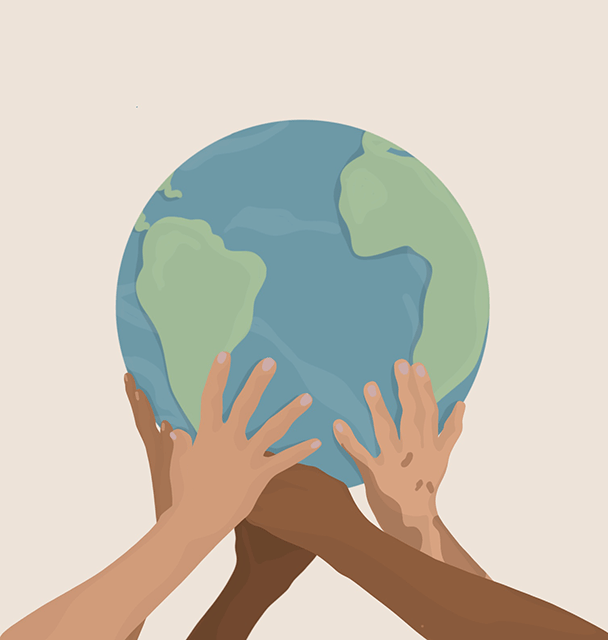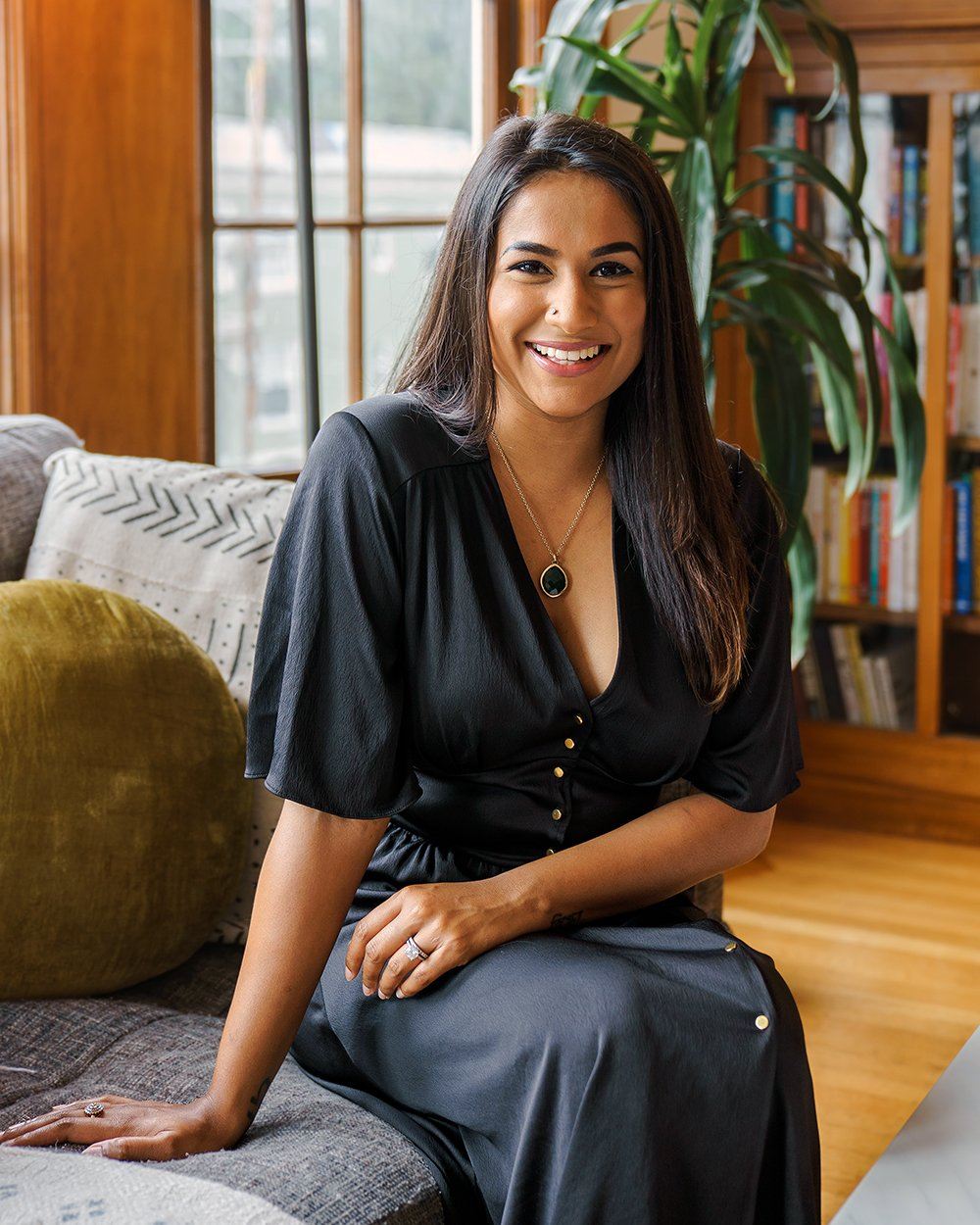According to the UN, women make up 80% of people displaced by climate change, and they’re at the forefront of the fight against it too. From community recycling initiatives to grassroots organizing and political upheaval, meet the women making their mark on climate advocacy.

SARA BLAZEVIC AND VARSHINI PRAKASH, USA
Blazevic and Prakash co-founded Sunrise Movement, the US-based initiative that staged a sit-in at Nancy Pelosi’s office, demanding climate action. The public protest received national attention, with first-term representative Alexandria Ocasio Cortez in attendance. The Movement has played a large part in bringing the Green New Deal to the forefront of public consciousness and is focused on mobilizing grassroots activism on climate change. The Deal demands that the US eliminates greenhouse gas emissions by 2030, in large part by investing in alternative energy sources. “I’ve honestly been blown away by what we’ve been able to accomplish in such a short amount of time,” says Prakash. “Just in the last eight months, we have seen our movement positively explode alongside this movement for a Green New Deal."
"Everything about the way that we talk about climate politics in this country has shifted on its head," she continues. "Now there’s a dominant discourse happening that is collectively talking about how we can achieve racial and economic justice through the pursuit of stopping climate change. I think it’s remarkable what a group of kids has been able to accomplish in such a short amount of time."

CHRISTIANA FIGUERES, COSTA RICA
Christiana Figueres was instrumental in drawing up the historic Paris Climate Agreement after being appointed Executive Secretary of the United Nations Framework Convention on Climate Change in 2010. She has continued to use her voice for climate advocacy through various endeavors, including her book, The Future We Choose, and her podcast, Outrage and Optimism. She has also facilitated a partnership between TED and Future Stewards called Countdown, mobilizing action and finding solutions for the climate crisis. “This is about moving toward a much better life,” says Figueres of fighting climate change. “A life that has better health conditions, that has better urban conditions, that has better transport conditions, that has safer investment conditions.”

MARY ROBINSON, IRELAND
Mary Robinson, the Former President of Ireland and UN High Commissioner for Human rights, is also the brain behind a book titled Climate Justice and a foundation dedicated to the cause. The Mary Robinson Foundation hosts forums for leading women in climate advocacy and conducts research into eradicating poverty with zero carbon emissions. “I came to climate change, not as a scientist or an environmental lawyer, and I wasn’t really impressed by the images of polar bears or melting glaciers,” says Robinson in her TED talk. “It was because of the impact on people, and the impact on their rights — their rights to food and safe water, health, education, and shelter."

ANNE HIDALGO, FRANCE
The City of Love is seeing an eco-makeover thanks to Anne Hidalgo. The mayor of Paris is fiercely committed to reducing greenhouse gas emissions in her city and adapting to warming temperatures. Through her governance, Paris has banned diesel cars and vans during the week, and restructured the city’s transportation system, encouraging a notable rise in bicycle use. Trees are also being planted all around the city, transforming more public areas into green spaces that can absorb heat, referred to as “Isles of Coolness” for hot summer days. Most impressively, the famous Champs Elysee will be undergoing a major green revamp that’s predicted to reduce car traffic by 50%. Hidalgo has approved plans to redesign the streets that include cutting vehicle space in half, turning roads into green, pedestrian areas, and creating tunnels of trees to improve air quality. “What we’ve undertaken is a whole program of adaptation, of putting nature back in this city,” says Hidalgo in an interview with the New York Times. But it hasn’t been without challenge. “Part of it has to do with being a woman," she continues "And being a woman that wants to reduce the number of cars meant that I upset lots of men. Two-thirds of public transport users are women.”

SUNITA NARAIN, INDIA
As the head of the Centre for Society and Environment (CSE), a research and advocacy organization dedicated to promoting sustainable development, Sunita Narain has advocated for climate justice across the board in her home country of India. She has performed research into and advocated for methods of reducing pollution, mitigating climate change, and improving water safety in the second-most populous country in the world. The Smithsonian has referred to Narain as “perhaps India’s most well-known environmental activist”, and she has been a devoted advocate for climate justice for developing nations, who will be hit hardest by climate change despite producing significantly fewer emissions than wealthier nations. “The poor in the world have not contributed to the making of the problem,” says Narain in an article for Down To Earth, CSE’s publication. “But let’s be clear, their pain will make our world more insecure. And this is only going to get worse. This is why we need to act and act now."

RACHEL KYTE, USA
Rachel Kyte has swiftly become the industry expert for heads of state and multinational CEOs seeking to transition away from fossil fuels. Leading up to the U.N. Climate Change Summit in 2019, Kyte used her voice to support the U.N. Secretary General’s push for countries and companies to commit to a speedier transition to renewable energy. She was also appointed leader of the World Bank’s climate program prior to the negotiations that yielded the Paris Agreement, for which Kyte devised strategies to allocate hundreds of billions of dollars to developing countries keen to tackle climate change but lacking in resources. Now, Rachel Kyte acts as the dean of the Fletcher School at Tufts University in Boston and heads Sustainable Energy for All, a non-profit bringing renewable energy to underdeveloped locations. “The work that I’ve done for the secretary-general...thinking through ways to arrive at 2050 with a decarbonized energy system that serves everyone, has been this extraordinary opportunity to show that we can do it cleanly and we can do it fairly and we will all be better off” says Kyte in an interview with TuftsNow.

HILDA HEINE, MARSHALL ISLANDS
As President of the Marshall Islands until January 2020, Hilda Heine spearheaded its proactive approach to addressing climate change. The country was the first to submit new, binding climate targets to the United Nations in 2018, pledging to reduce emissions by at least 32% before 2025, and 45% by 2030. The nation is particularly vulnerable to sea-level rise from climate change, encouraging them to “lead from the front”, according to Heine. “If we can raise the ambition of our climate action then so can other countries — and so must other countries”, said to the then-President to Reuters. Heine also chairs the Climate Vulnerable Forum for countries that are particularly susceptible to the effects of climate change. “The woman’s role in government is critical,” she said to Bright Magazine, “Women are key activists protecting vital common resources and at the forefront of developing local climate solutions respecting and incorporating local knowledge."

HINDOU OUMAROU IBRAHIM, CHAD
Ibrahim has been a dedicated advocate for climate justice, representing indigenous people and the issues they confront due to climate change. As an indigenous woman from the Mbororo community in Chad, she has written much about the role of indigenous people in environmental conversation and worked with UNESCO to gather indigenous knowledge and to create a 3-D landscape mapping project. Hindou Oumarou Ibrahim is also the Gender and Climate Representative for Congo Basin at the Indigenous Peoples of Africa Co-ordinating Committee (IPACC), and in the past served as co-chair of the Indigenous People’s Forum on Climate Change. “For all Indigenous Peoples, from any corner of the world, livelihoods are linked to natural resources, for our food and medicine, for everything, so if there are floods or droughts, the impact is greater for us,” said Ibrahim following the signing of the Paris Agreement. “Climate change threatens our basic rights, our cultural values, and the very survival of these communities."

RHIANA GUNN-WRIGHT, USA
In the mid-2010s, Rhiana Gunn-Wright was working in Detroit’s department of health. It was there that she realized how much environment intersects with a wide variety of social justice issues. This made her even more sure of her conviction that the government desperately needed to address the crisis, but “you weren’t going to solve the problem with just solar panels”. Gunn-Wright is working behind the scenes at New Consensus, a think tank tied to progressive lawmakers, to implement that holistic approach at the national level. She acts as the lead for the group’s Green New Deal policy, tackling the details of the program and ideating strategies for pitching the climate plan.

WU CHANGHUA, CHINA
When Wu Changhua began documenting environmental issues as a young photojournalist in Beijing, she thought it was nothing more than “planting trees and keeping the streets clean”. It was 1990 and not many policymakers in China suggested otherwise. Their priority was exponential growth, whatever the cost. After some time in journalism, Wu moved into business and advocacy, where her dedication helped transform China’s economy from an environmental monstrosity towards a proponent of climate action on the global stage. She had to buckle down and work behind the scenes to achieve these results. China was being publicly reprimanded by international institutions, due to its emission-heavy factories and toxic waterways, meanwhile, Wu was liaising with officials to implement global standards into the industry and urban planning in the country. “For a long time we were ignored, marginalized, but now we’re pretty much mainstream,” says Wu, who is now the CEO of the Future Innovation Center and the founder of TECONET, which links global clean technologies with market and capital in and from China.

ISATOU CEESAY, GAMBIA
When you’re known throughout your country as the “Queen of Plastic”, you know you’ve made a significant impact. For 17 years, Isatou Ceesay has been empowering women in Gambia to recycle plastic waste -- the country’s biggest pollutant. In 1998, Ceesay, the founder of Women’s Initiative The Gambia (WIG), launched One Plastic Bag (OPB), a recycling initiative encouraging women to reclaim waste and turn it into revenue. Each week, members of WIG craft wallets, bags, and balls for kids, utilizing reclaimed plastic bags. Since its inception, the group has attracted over 2,000 members from 40 different communities across the country, several of which now use paper, rather than plastic, bags in local stores.

SYLVIA EARLE, USA
Sylvia Earle, a world-renowned oceanographer, has pioneered the conversation about the threats of overfishing and ocean pollution for over 40 years. She is well-known for her research on marine algae and her several books and films documenting the challenges facing our oceans. Earle also holds the world record for the deepest untethered scuba dive, having led multiple underwater expeditions through the Galapagos Islands, China, the Bahamas, and more. In 2009, Sylvia Earle launched Mission Blue, an organization dedicated to building a global coalition for ocean protection measures and to “ignite public support for a global network of marine protected areas”.




Leave a comment
All comments are moderated before being published.
This site is protected by hCaptcha and the hCaptcha Privacy Policy and Terms of Service apply.